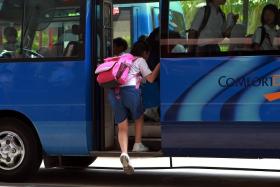Don't deliver kids' forgotten items, school tells parents
Kuo Chuan Presbyterian Primary School wants its pupils to be responsible for their actions
Here's a school that believes parents should let their children learn to be self-reliant.
Signs are put up at entry points of Kuo Chuan Presbyterian Primary School (KCPPS) to discourage parents from dropping off their children's forgotten items.
"Please turn around and leave..." state the signs.
The school feels that children should take responsibility for their actions: "Let your child grow up. Your child will learn to solve problems and take responsibility for the consequences in your absence."
Every day from 8am to 9am, there will be at least three to four parents or domestic helpers delivering forgotten items such as water bottles, textbooks and pocket money to the school in Bishan Street 13, said a school security guard.
They are redirected to the general office, where they are turned away.
KCPPS principal Teo Ching Ling told The New Paper: "Taking responsibility for their own learning and belongings is an important life skill we require our pupils to learn as part of our values education and is in alignment with one of our school values, self-discipline.
"As parental involvement is critical in this endeavour, the school had sought parents' cooperation to refrain from delivering forgotten items and homework for their children as part of the learning process."
Madam Teo added: "The sign was put up to serve as a visual reminder for parents to partner the school in this effort."
Parents told TNP yesterday that the school keeps emphasising at parent-teacher meetings and in e-mail circulars that children should take responsibility for their mistakes and learn to be accountable.
But that message apparently has not gotten to some parents, which prompted the school to put up the signs prominently around its premises this week.
Ten parents told TNP yesterday afternoon that they support the school's action.
Mrs Karen Ang, 45, who has two children in KCPPS, said her daughter in Primary 4 recently left her art folder in the car after being dropped off.
Her husband then took it to the general office, thinking it would be handed to their child. It wasn't.
Mrs Ang said: "We learn that children can handle responsibility. And if we all want to drop things off, there will be so many parents here disturbing the school."
Domestic helper Yati Wagimin, 41, said her employer's son, who is in Primary 2, is forgetful.
"Once, he forgot to bring his wallet to school, but he knew that he could borrow money from the general office for recess. He returned the money the next day," she said.
Clinical psychologist Carol Balhetchetsaid: "Primary school is a child's first step into the education environment, and it is a parent's natural instinct to be protective.
"After the first year, parents do not need to be overly cautious as children need to fend for themselves, be self-reliant and responsible."
Another psychologist, Mr Daniel Koh, said if parents are constantly solving problems for their children, it will affect their ability to be alert.
He said: "The child may not have the awareness to look out for issues, prepare or plan ahead. Lack of independent and required skills can cause uncertainty when he has to deal with issues on his own, hence, not instilling character growth."
On raising independent kids
Clinical psychologist Carol Balhetchet offers five tips on raising independent kids:
- Tough love is to be kind and firm. To be kind is to understand the child's needs, and make sure he is safe and comfortable in his social environment. But be firm - be assertive that the child needs to be independent. For example, let him carry his school bag himself.
- Be there for your child. Parents do not need to be physically present all the time, but make sure to provide the emotional support the child needs. If he feels unsafe, be sure to address the issue.
- Give your child undivided attention. For instance, spend time talking over dinner.
- Listen to your child. Don't keep preaching, advising or nagging, as he may rebel when he gets older.
- Help your child be more independent, because one day, he will have to take responsibility for his own actions. So do it while you are around to help and correct him.
Get The New Paper on your phone with the free TNP app. Download from the Apple App Store or Google Play Store now


